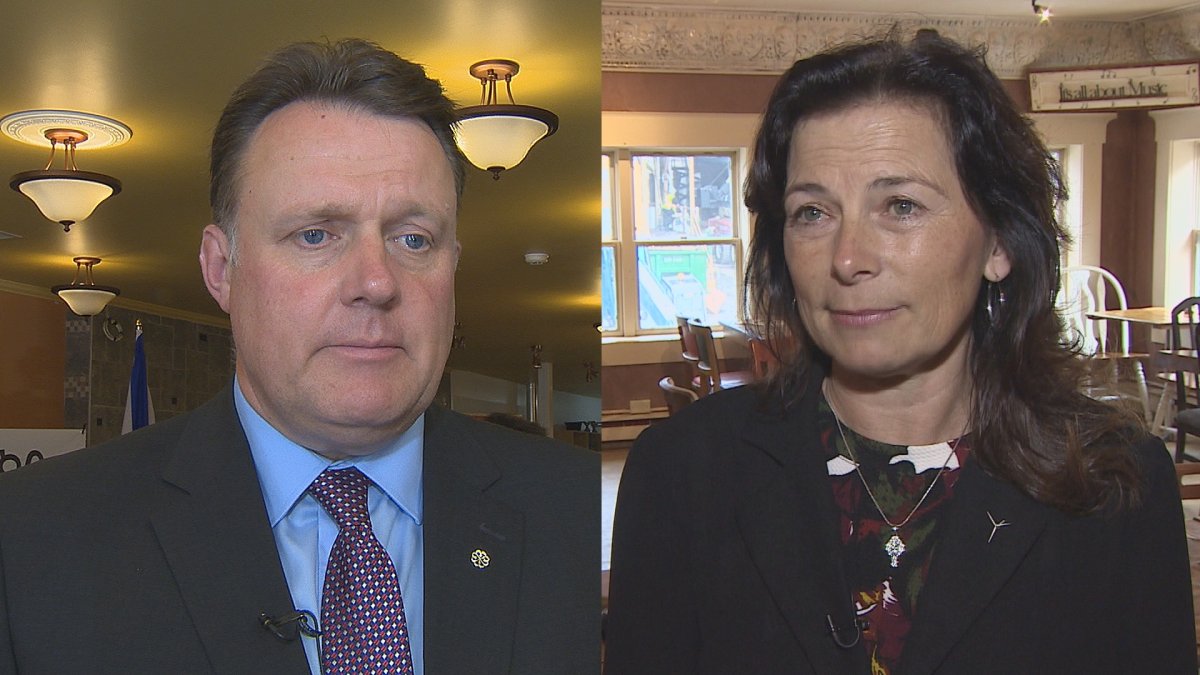The candidates for Halifax’s highest municipal office have agreed to ditch lawn signs as a way of sending a message that political campaigns shouldn’t produce unnecessary waste.

Halifax Mayor Mike Savage and his only opponent, Lil MacPherson, issued a joint news release Monday saying they’ve agreed to forego the traditional lawn signs in favour of other means of advertising ahead of next month’s vote.
READ MORE: Candidates lace up for apparent two-way race to become Halifax’s next mayor
The two candidates say they believe it’s the first time in Canada that lawn signs will not be used in a contested mayoral race.
MacPherson, a climate change activist and owner of the Wooden Monkey restaurant, says she was approached by Savage and didn’t feel she could refuse.
“It’s a hard choice for me because … everyone knows Mike and everyone knows me in the city as an environmentalist,” she said.
“I’m glad that’s he’s starting to think green, so it’s hard for me to say ‘no’.”
The decision eliminated 4,000 to 8,000 signs and is a sign of a rethinking of political norms, she added.
‘You can run an election without having chloroplast (signs) on every corner’
Savage said he has thousands of signs that he won’t be putting up and will instead be provided for rallies and perhaps be placed in people’s windows.
“I personally believe you can run an election without having chloroplast (signs) on every corner, and that’s what we’re trying to do,” Savage said in an interview.
Savage says the “no signs” deals meshes with the city’s reputation for taking some steps forward on environmental issues, citing the community’s Solar City program that assists homeowners to install solar panels as an example.
READ MORE: Downtown Halifax businesses take legal action over Nova Centre construction impact
MacPherson disagrees with her opponent on this point, saying compared to most major centres, Halifax has fallen behind on environmental issues.
“We’re crawling along while the world is running,” she said.
Andrew Biro, a professor of politics at Acadia University, says that the gesture is a rare one that has symbolic value but he is reserving judgment on whether it means municipal politics is generally becoming more sensitive to environmental issues.
It could reflect a view that signs are less effective in campaigns, he says.
“A lot more election campaigning happens online than in the past. Candidates reach voters through social media lists more than they do having signs out in the public,” said Biro in a telephone interview.
Biro said Savage may possibly benefit more strategically because he already has strong name recognition.
“Name recognition is important and you often get people voting on that basis,” he said. “His opponent’s name won’t be out there in the public realm as much as it might otherwise be.”
On the other hand, Biro says that MacPherson – who was already the candidate with a strong following among environmentalists – has boosted her credibility by agreeing to the idea.
“If it raises environmental issues in this campaign, that might play to her advantage,” he said.
Savage said during an interview that he didn’t make the decision for political gain.
“We have thousands of places that will take a sign right off the bat and we’re not putting them up,” he said.



Comments